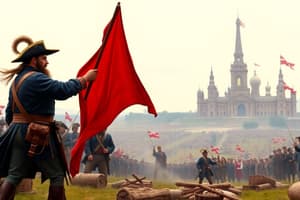Podcast
Questions and Answers
When was the French and Indian War?
When was the French and Indian War?
1753-1763
What name was the French and Indian War also known by and why?
What name was the French and Indian War also known by and why?
The 7 Years' War, because even though the war technically went on for 10 years, only 7 of those years were spent fighting.
Who really fought in the French and Indian War?
Who really fought in the French and Indian War?
The French and Indians fought against Great Britain and Indians.
Why did some Indians ally themselves with the French?
Why did some Indians ally themselves with the French?
Why did some Indians ally themselves with the British?
Why did some Indians ally themselves with the British?
Where was the French and Indian War fought?
Where was the French and Indian War fought?
Why was the French and Indian War fought?
Why was the French and Indian War fought?
What was Fort Necessity and how did it come into being?
What was Fort Necessity and how did it come into being?
What was the relationship between France and Britain?
What was the relationship between France and Britain?
How much did the war cost?
How much did the war cost?
Who really fought for Great Britain?
Who really fought for Great Britain?
Describe the Albany Plan of Union.
Describe the Albany Plan of Union.
Why didn't the Albany Plan of Union work?
Why didn't the Albany Plan of Union work?
What was the Albany Plan of Union's real name?
What was the Albany Plan of Union's real name?
What is a confederacy?
What is a confederacy?
What is a perpetual union?
What is a perpetual union?
Why was Albany chosen as the rendezvous spot?
Why was Albany chosen as the rendezvous spot?
What was the turning point in this war?
What was the turning point in this war?
What happened in 1763?
What happened in 1763?
What did the Treaty of Paris give Britain?
What did the Treaty of Paris give Britain?
What didn't Britain ask for in the treaty?
What didn't Britain ask for in the treaty?
Flashcards are hidden until you start studying
Study Notes
French and Indian War Overview
- Occurred from 1753 to 1763, also known as the Seven Years' War despite lasting ten years due to a treaty-signing period.
- Conflict involved French and Native American allies against Great Britain and its Indian allies.
Alliances
- Algonquian and Huron tribes allied with the French, favored their smaller, less threatening settlements over the expanding English colonies.
- The Iroquois League allied with the British, motivated by trade relations where Indians sought tools and weapons in exchange for furs.
War Location and Causes
- Fought on North American territory, primarily over control of the fertile Ohio River valley and its lucrative fur trade.
- The conflict escalated after the French built forts in the region, leading to British military involvement in 1753.
Key Events
- Fort Necessity was established by George Washington and his troops but ended with their surrender, marking an early engagement in the war in 1754.
- Relationship between France and Britain was strained, despite their royal blood connection, driving them into conflict.
Cost and Consequences
- The war was financially burdensome, requiring significant resources and logistics for troop deployment in America.
- Colonists bore the brunt of fighting for British interests, facing the risk of falling under French control.
Albany Plan of Union
- Proposed by Ben Franklin, this plan aimed to unify the colonies by establishing a Grand Council responsible for taxation and military organization.
- The proposal failed due to opposition from Britain, which deemed it treasonous to challenge royal authority.
Treaty of Paris 1763
- Signed in 1763, concluding the war; Britain gained vast territories including all of Canada, regions from the Appalachian Mountains to the Mississippi River (excluding New Orleans), and Florida from Spain.
- Britain did not request reparations from France, deviating from typical post-war agreements.
Strategic Military Move
- The capture of Quebec by British General James Wolfe in 1759 marked a crucial turning point, significantly shifting the war's momentum despite the ongoing conflict for four additional years.
Definitions
- Confederacy refers to a loose alliance of groups.
- Perpetual union signifies an everlasting unity among allied entities.
- Albany's selection as a rendezvous point was due to its fortification and limited civilian presence during wartime.
Studying That Suits You
Use AI to generate personalized quizzes and flashcards to suit your learning preferences.




